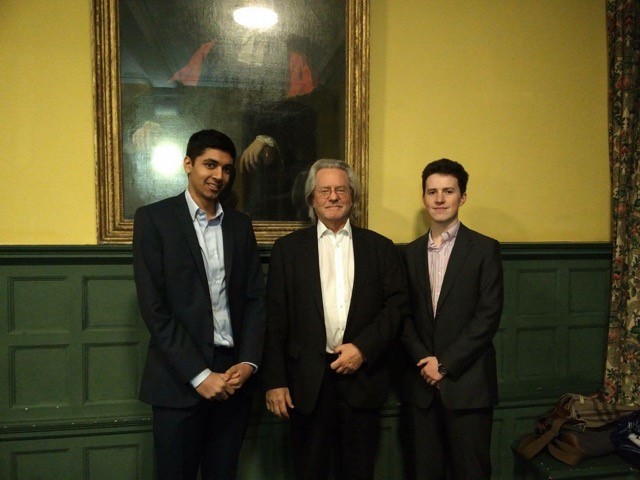 The Brasesnose PPE (Philosophy, Politics and Economics) Society was set up in 2016 by us, (Vivek Gupta and Will Feerick) two second year PPE-ists. The aim of the society is to invite interesting speakers to come and talk to students on topics related to one of the three subjects.
The Brasesnose PPE (Philosophy, Politics and Economics) Society was set up in 2016 by us, (Vivek Gupta and Will Feerick) two second year PPE-ists. The aim of the society is to invite interesting speakers to come and talk to students on topics related to one of the three subjects.
AC Grayling came in earlier in the term. He is one of Britain’s most public philosophers and has written books on many topics from philosophical logic to friendship. He spoke to us on one of the most important questions any PPEist must consider: what does it mean for a politician to be ethical?
The opening conceit of his talk was a stark comparison: Aristotle and Machiavelli. Aristotle thought that ethics and politics were closely linked, and so that the political man must be an ethical man. Machiavelli, however, famously endorses devious tactics and subterfuge as politicians’ tools. Grayling proposed a middle way. Aristotle, he said, was too naïve, as in the age of 24 hour news and tabloid newspapers no politician can get things done while also sustaining virtuous traits. On the other hand, we do not want politicians to run amok with underhand methods and unchecked immorality. Grayling suggested that rather than hoping for saintly individuals to populate parliaments we should place the ethical burden on the structures of government. Through limiting laws, such as Magna Carta, Habeas Corpus and the Human Rights Act, we can constrain our politics to allow for human fallibility and still prevent the abuse of power. After the talk, there was a lively discussion between Grayling, students and tutors. All told it was a very popular event and we were very lucky to have a lucid talk from a prestigious philosopher.
A week later we were lucky enough to welcome Sir Paul Collier, (who we are pictured with) one of the foremost development economists in the world and author of The Bottom Billion. Professor Collier gave a lecture entitled “Angela Merkel: Saintly or Irresponsible?” to students and tutors. It was an insightful talk where Professor Collier argued that there were long term costs to the Syrian economy of migration of its workforce to Europe. He began by describing the situation and problems that have resulted from the war in Syria. One particularly notable fact is that those coming over to Europe are predominantly young middle class men since it is only the middle class who can afford the $6000 boat trip and it is the young men who will be most capable of gaining employment to send money home. Furthermore the people who are already out of Syria and in refugee camps are not those most in danger. Professor Collier went on to criticize the European policy of welcoming and providing for refugees as contravening the norm of “thou shall not tempt” in international relations. This means that by offering refugees homes and looking after them all, what Germany is doing is tempting thousands more people to embark on the perilous journey across the sea, thus lining the pockets of human traffickers and risking their lives. Obviously a solution to the problem is difficult since what are you supposed to do to refugees when they are on your doorstep? We also learnt about efforts to incubate the Syrian economy in industrial zones in Jordan, although these projects are yet to be proven and executed.
The talk was an excellent overview to the refugee problem and the challenges that politicians faced. We are hugely grateful to Professors Grayling and Collier for giving up their valuable time to talk to us. We have loads more of interesting talks planned with Lord Feldman, Tim Harford and Guy Spier all in the pipeline for summer 2016.
Read more about PPE at Brasenose College.
